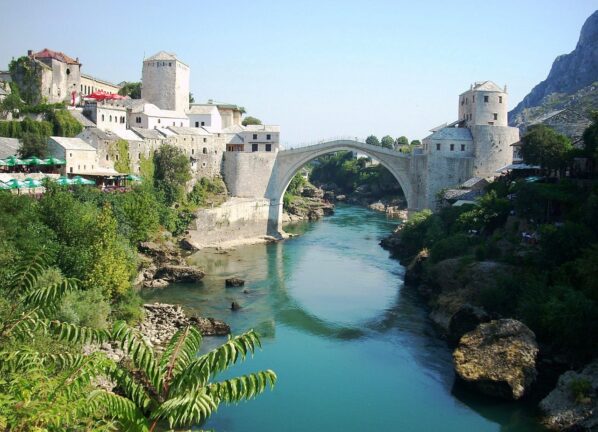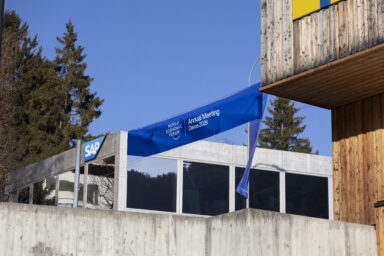The European Union has deepened its migration-control footprint in the Western Balkans. Wednesday‘s agreement allows Frontex, its border agency, to deploy forces across all of Bosnia and Herzegovina’s frontiers—including borders with non-EU states and key airports.
Signed by Magnus Brunner, EU Commissioner for Internal Affairs and Migration, and Borjana Krišto, Chairwoman of the Council of Ministers of Bosnia and Herzegovina, on Wednesday in Brussels, the deal marks the bloc’s latest effort to stem irregular migration and solidify influence in a region pivotal to its geopolitical ambitions. While framed as a security partnership, the pact underscores the EU’s growing reliance on hard borders to manage political anxieties over migration—even as arrivals plummet.
Operational muscle
Officials attribute this to Frontex-led operations and EU-funded border infrastructure in the region. The new Bosnia agreement aims to lock in these gains by enabling Frontex’s “standing corps” of 10,000 officers to patrol alongside Bosnian forces, conduct surveillance, and process asylum claims. Critically, the mandate extends to Bosnia’s borders with Serbia, Montenegro, and Croatia—a strategic buffer zone for the EU’s external frontier.
Since 2009, Frontex has advised Bosnian authorities under a limited working arrangement, with a small contingent stationed at Sarajevo Airport. The upgraded status agreement—the sixth under Frontex’s 2019 reinforced mandate—mirrors pacts already in force with Albania, Montenegro, North Macedonia, Serbia, and Moldova. It grants the agency unprecedented operational flexibility: joint patrols can now be deployed “anywhere” along Bosnia’s 1,500 km of borders, including land crossings and airports.
Sensitive areas
Yet the deal remains delicately conditional. Any deployment requires a formal request from Bosnia and must adhere to an “operational plan” negotiated with local border police. This caveat is crucial for a country still grappling with ethnic divisions and EU accession hurdles. Critics warn that outsourcing border control to Frontex risks inflaming local tensions, particularly in Serb-dominated Republika Srpska, where EU oversight is viewed skeptically.
“Bosnia and Herzegovina is a vital partner in ensuring effective migration management along the Western Balkans route,“ commented Henna Virkkunen, Executive Vice-President for Tech Sovereignty, Security and Democracy. “Today’s agreement is another step to keep working towards a strong, coordinated action in protecting our shared space. With this agreement, Frontex can extend its support to Bosnian border guards, enhancing capacity, strengthening the rule of law, and tackling migrant smuggling,“ Ms Virkkunen said.
You might be interested
EU’s Western Balkans calculus
The agreement advances the EU’s December 2022 Action Plan for the Western Balkans, which ties migration management to broader pre-accession reforms. Bosnia, a candidate since 2022, is under pressure to align its asylum policies with EU standards—a process now accelerated by Frontex’s expanded role. The bloc has funneled €25m via the Instrument for Pre-accession Assistance (IPA) since 2022 to upgrade Bosnian border tech, train officers, and fund biometric systems.
Working together brings tangible results. The Western Balkans are an integral part of Europe’s stability and security space. Magnus Brunner, EU migration Commissioner
But the pact also serves Brussels’ defensive interests. With Frontex now active in five Western Balkan states (and Moldova), the EU has effectively externalized its border enforcement, shifting migration bottlenecks beyond its territory. This “pre-emptive containment” strategy has drawn praise for reducing arrivals but faces scrutiny over human-rights compliance, particularly in non-EU states with weaker oversight.
Rising stakes
The deal enters force after approval by the European Parliament, Council, and Bosnian lawmakers—a process likely to face minimal resistance given the region’s reliance on EU funds. Provisional application begins immediately, however, allowing Frontex to scale up patrols ahead of summer—a peak season for migration.
“Thanks to close cooperation with Western Balkan partners, irregular border crossings along this route have dropped by nearly 95 per cent compared to 2022,“ said Magnus Brunner, Commissioner for Internal Affairs and Migration. “This confirms that working together brings tangible results and that the Western Balkans are an integral part of Europe’s stability and security space. Today’s agreement with Bosnia and Herzegovina is another important step in strengthening our shared responsibility for effective border management and a safer Europe,“ Mr Brunner said.
Win and admission
For the EU, the agreement is both a tactical win and a tacit admission of fragility. Despite plunging migration numbers, populist pressures in member states like Austria and Italy keep border security atop the agenda. Meanwhile, Russia and Turkey continue to weaponize migration flows, testing the bloc’s cohesion. By anchoring Frontex in Bosnia, Brussels seeks to insulate itself from such shocks—but risks conflating border control with lasting stability in a region still scarred by war.
As Frontex’s standing corps expands, so too does the EU’s quandary: Can it balance hard-edged security with the soft-power promises of enlargement? For Bosnia, the answer may hinge on whether Brussels’ border priorities align with its own democratic aspirations—or merely extend the bloc’s perimeter, leaving Sarajevo to manage the contradictions.
By the numbers
The Western Balkans route, once a major corridor for migration into the EU, has seen a dramatic downturn since 2022:
– 145,600 irregular crossings detected in 2022
– 21,520 in 2024—an 85% drop
– 58% decline in early 2025 (per preliminary data)











